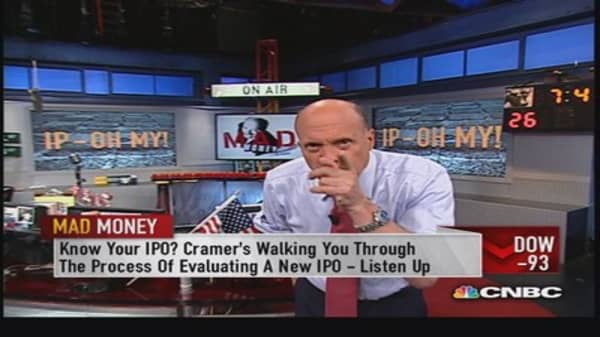In addition Cramer also examines who benefits from the IPO.
"Private equity firms, like Blackstone, KKR, Thomas Lee, Carlyle, and Cerberus, have all bought dozens of companies in the last few years. Sometimes the purchase was shrewd but other times they overpaid badly. In the latter case, they need to offload these companies into the open market so they can get them off the books. Therefore, at best, these private equity IPOs, almost as a rule, are difficult," Cramer said.
Cramer also notes the financial firms involved in the IPO
"I want them to be major firms along the lines of Goldman Sachs, Morgan Stanley or Credit Suisse or JPMorgan. Why does that matter? Because these firms have their reputation on the line with each deal, and that makes them less willing to bring a klunkler public just for the fees. I consider the brokerage that's underwriting the deal as a fairly good seal of approval for the enterprise."
Only if a company passes this three pronged test will Cramer's continue to determine if the company is in fact investable.
Make no mistake, "Just because it's met the criteria above doesn't mean it isn't terrible," he said. "It could still be a piece of junk."
From this point Cramer assesses the size of the market, the power of the competitors, and then he determines how the company that's coming public is valued versus similar players.
Then he looks at other metrics he talks about all the time on Mad Money; metrics such as growth potential, margins, fixed and variable costs and, of course, debt.
"Only if an IPO meets all my criteria do I ever put in for the deal," Cramer said. "It must all be favorable."
-------------------------------------------------------
Read More from Mad Money with Jim Cramer
5 things Cramer says you should own, right now!
Cramer's single most important investing rule
Are you making too much money from the market?
-------------------------------------------------------
What's the bottom line?
When Cramer analyzes an IPO, he begins with pedigree. That is he asks himself who are the executives? Then he examines who benefits from the IPO and the financial firms involved in the deal. If the IPO can pass that 3 pronged test, he then determines the addressable market, the competitors, and the historic growth rate of the company versus the growth rate of the market itself.





